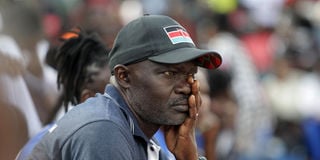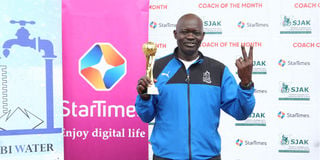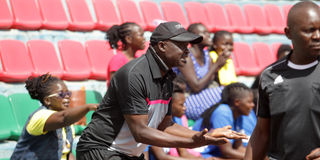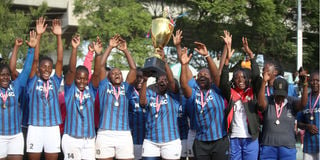Premium
Jack Ochieng: The overflowing tap of handball excellence at Nairobi Water

Nairobi Water coach Jack Ochieng follows their Kenya Handball Federation Super Cup match against Ulinzi Sharks from the bench at Nyayo National Stadium in Nairobi on May 21, 2023.
What you need to know:
- It’s at Kaloleni where Ochieng cut his teeth as a handball player and coach while turning out for boyhood club Black Mamba
- For the 57-year-old Ochieng, who holds an International Handball Federation Level C coaching certificate, coaching is more of a calling
- Ochieng is credited with scouting and nurturing players such as Brenda Musambai, Brenda Ariviza, Gladys Chillo, Merina Andala, Mitchell Adhiambo, and Tracy Ongiri who have consistently made Nairobi Water tick both on the local and regional front over the past decade
Jack Ochieng cuts a passionate figure every time he stands on the touchline.
He is the coach of Kenya Handball Federation women's National League record champions Nairobi Water, a club he has called home for the last 13 years since its formation in 2010. Ochieng has won the local league title with Nairobi Water since 2013 and recently guided them to their 10th East and Central Africa Handball Clubs Championship title.
A man of many hats, he also doubles up as the national women's team and persons with hearing impairment women's team coach. Born and raised in Kaloleni estate, located on the east side of the capital city, Nairobi, Ochieng has been in handball all his life.
It’s at Kaloleni where Ochieng cut his teeth as a handball player and coach while turning out for boyhood club Black Mamba. Football and handball were the preferred sport for Kaloleni residents but Ochieng had a soft spot for basketball before handball won him over.

Nairobi Water coach Jack Ochieng after he was awarded with the StarTimes/ SJAK Coach of the Month award for March at the Company Headquarters in Nairobi on May 30, 2023.
"I was a good basketball player when I was studying at Pumwani Secondary School, but after I cleared school, all that stopped. There were only football and handball pitches in the vicinity. Children began learning the sport at a young age, and most of them were forced to learn how to play. In the afternoon, coaches who were directed by parents would make rounds in the houses to ensure all children were outside trying to learn and play handball. Once they came of age, they would join the team," recollected Ochieng.
"It didn't take long before I mastered how to play the sport. I was drafted into the team and within a short period, I became a regular player. I later earned a call-up to the national team but, unfortunately, the performance just like now didn't improve,” said Ochieng.
Disastrous move
Ochieng has fond memories of his time at the junior national team notably the Youth Commonwealth Games held in Salford, England in 1986. It was after this assignment that Ochieng and his teammates Raymond Osewe, Naftali Wakata, and Charles Newa decided to dump Black Mamba to join Umeme Ziwani Club.
The move did not go down well with residents of Kaloleni which was Black Mamba’s home ground and they were instantly labelled as outcasts.

Nairobi Water coach Jack Ochieng (centre) reacts during their Kenya Handball Federation National League match against Nanyuki on November 21, 2021 at Nyayo National Stadium.
"There was this feeling of pride. We thought we had gained exposure and experience that we no longer had to play in the dusty Kaloleni "Ololo" grounds that was home to Black Mamba. We wanted a chilled place, with better facilities and we thought Ziwani fit the bill so we decamped," narrates Ochieng.
"Kaloleni is not just an estate but a community. I remember, when we switched to Umeme, we were regarded as enemies and outcasts. No one wanted to talk to us or associate with us. You could tell even from the older guys who would turn away whenever we greeted them or wanted to have a chat. I remember during a league match against Black Mamba, it was not a match but a physical contest. Black Mamba would come hard at us and that prompted us to rejoin them to rekindle our love with Kaloleni locals.
"I played for Black Mamba and the national team until the late 1990s before I moved to coaching," said the father of four.
New challenge
For the 57-year-old Ochieng, who holds an International Handball Federation Level C coaching certificate, coaching is more of a calling.
"Many times, I find myself giving instructions to other teams if Nairobi Water is not playing. I just like to share the knowledge I have with other coaches and players. It pains me if a player makes stupid and unnecessary mistakes especially that which he or she could have avoided," opens up Ochieng.
His impressive stint with Black Mamba as coach earned him admirers in the local handball scene. Therefore, when Nairobi Water were forming their team in 2010, two founding members Mary Musau and Caroline Kusa easily identified Ochieng to lead the project.

Nairobi Water coach Jack Ochieng congratulates his players after their Kenya Handball Federation National League match against Jomo Kenyatta University of Agriculture and Technology (JKUAT) at Nyayo National Stadium in Nairobi on November 4, 2023.
"I had coached Black Mamba before Kusa and Musau approached me to coach Nairobi Water coach, a new team that they were forming in 2010. I had done it all for my hood club and I was ready for a new challenge," said Ochieng.
Ochieng is credited with scouting and nurturing players such as Brenda Musambai, Brenda Ariviza, Gladys Chillo, Merina Andala, Mitchell Adhiambo, and Tracy Ongiri who have consistently made Nairobi Water tick both on the local and regional front over the past decade.
"It has been long since we recruited a big number of players like we did in 2013. But I'm happy that the foundation we put in place for these players has been successful since all of them are also part of the national team," said Ochieng with the pride of a parent.
"The first three years after joining the league, we came short, twice finishing behind National Cereals and Produce Board before we won our first title in 2013. Since then, we have won back-to-back titles. The foundation that we build the team on is what has kept it intact. Discipline, trust, and openness are the main attributes," he disclosed.
Lack of exposure
Despite his impressive record with Nairobi Water, Ochieng has failed to sparkle with the national team. However, he points out that the government's lukewarm support and lack of proper structures have been consistent stumbling blocks.

Nairobi Water players and officials celebrate with the trophy after winning the women's East and Central Africa Handball Clubs Championship title at Nyayo National Stadium on December 9, 2023.
"Exposure and experience are key to the growth of a player and team at large. For example, Nairobi Water’s previous participation in the African Clubs Championship has helped the players to overpower their local and regional competitors. But since we stopped participating in the Clubs Championship in Burkina Faso in 2016, teams like Kenya Defence Forces are now closing in on us," said Ochieng.
"Apart from the national teams participating in the African Games, Cup of Nations qualifiers, and International Handball Federation (IHF) Trophy Zone Five, there are no other events that the they compete in. With that kind of setting, the sport will never grow. That's why we have stagnated. Things would be different if the teams participated more in international events," offered Ochieng.
But for now, he is keen on pouring even more into Nairobi Water who are on course to defend their local league title having successfully retained the regional one last weekend.
To put Ochieng’s longevity into perspective, Nairobi Water’s founding players, Caroline and Mary, have since retired. While Caroline is the current Nairobi Water team manager, Mary works with the Salaries and Remuneration Commission.
Truly, this is the tap that keeps running and overflowing...a beacon of handball excellence at Nairobi Water!





